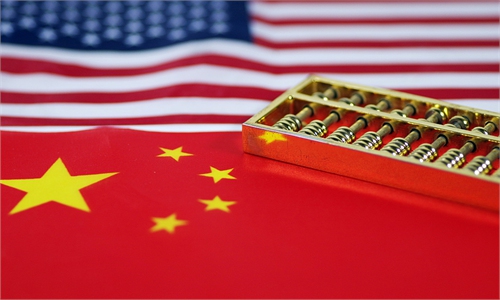
Xisha Islands in the South China Sea Photo: VCG
The Trump administration on Wednesday imposed sanctions on 24 Chinese companies over South China Sea island building, adding them to the entity list, and imposing visa restrictions on Chinese individuals. This is another new measure adopted by the US to expand its conflict with China.
The US has been planning for a long time to initiate the sanctions. They launched it at a time when the presidential election is about two months away. Washington wants to use the sanctions to show its hard-line attitude toward China, and to benefit Donald Trump's presidential campaign. This can be seen as a diplomatic move to coordinate with the current administration to seek reelection.
The sanctions are designed with the election in mind. They will create limited damage to the Chinese companies, but will generate some uncertainty for those companies' overseas businesses. By announcing the sanctions, the US has further played up its stance on South China Sea sovereignty issue. It has stepped up confronting China in the waters. But Washington did not make any implication to upgrade its strategic goals in the region, or start a military competition with China.
Disputes over the sovereignty of the South China Sea have gone through several rounds of ups and downs, and regional countries have gradually adapted to the situation. Negotiations over the South China Sea Code of Conduct are underway, which means room for the US and other external forces to maneuver to hype up brawls in the region is limited.
The real risk of the regional situation is possible military friction. Compared with previous years, other claimant countries in the South China Sea are now less likely to be involved in maritime incidents with China. However, the risk of accidental China-US maritime and air conflicts is rising. This is the real focus of the tense situation in the South China Sea.
On the one hand, the US aggressively promotes its so-called freedom of navigation in the South China Sea and continues to put pressure on China. On the other hand, the US fears China's modernizing of its maritime and land-based missile forces, as well as China's determination to safeguard the bottom line of its national interests. As long as our will to resolutely counterattack when being attacked does not sway, US provocation in the South China Sea will be restricted, and will remain cautious in challenging China's bottom line.
Speculation has been spreading that the PLA launched DF-21D and DF-26B missiles into the South China Sea on Wednesday. The Chinese side has neither confirmed nor denied it. As the US military flexes its muscles in the South China Sea more frequently, the PLA must increase its actions in the waters accordingly to suppress US arrogance and reinforce the US understanding that China does not fear a war, and will not soften its stance in the face of a conflict. Washington should not assume that a military flare-up can deter the Chinese people.
US sanctions against Chinese companies are a marginal tactic amid the China-US competition in the South China Sea. It cannot really pressure China, nor can it encourage countries like Vietnam and the Philippines. The Chinese people would only scoff at the US visa restrictions on Chinese. While the pandemic is far from over in the US, how many Chinese people would be willing to go to the worst virus-stricken country across the Pacific?
The US side constantly includes Chinese companies into its entity list, and it is not easy for the Chinese side to carry out reciprocal retaliation. But China does not have to be frustrated. On the one hand, all commercial sanctions are double-edged swords. When the US sanctions a Chinese company, US companies also suffer. On the other hand, Chinese companies will learn to avoid being sanctioned by the US, and the Chinese economy will gradually have the ability to strategically avoid risks. Such adaptability will speed up.

